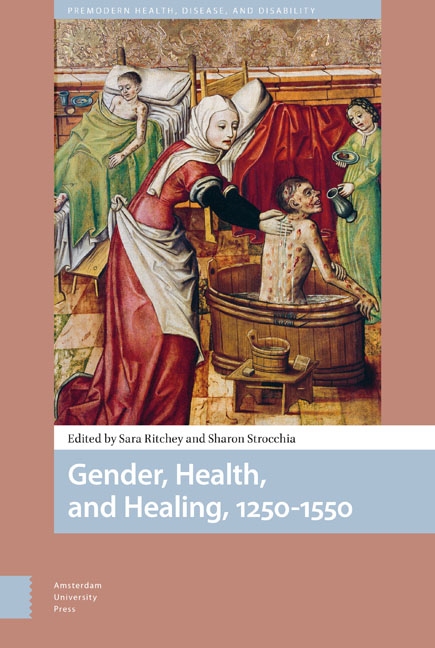Book contents
- Frontmatter
- Contents
- List of Figures and Tables
- Acknowledgments
- Abbreviations
- Introduction: Gendering Medieval Health and Healing: New Sources, New Perspectives
- Part 1 Sources of Religious Healing
- 1 Caring by the Hours: The Psalter as a Gendered Healthcare Technology
- 2 Female Saints as Agents of Female Healing: Gendered Practices and Patronage in the Cult of St. Cunigunde
- Part 2 Producing and Transmitting Medical Knowledge
- 3 Blood, Milk, and Breastbleeding: The Humoral Economy of Women's Bodies in Medieval Medicine
- 4 Care of the Breast in the Late Middle Ages: The Tractatus de passionibus mamillarum
- 5 Household Medicine for a Renaissance Court: Caterina Sforza's Ricettario Reconsidered
- 6 Understanding/Controlling the Female Body in Ten Recipes: Print and the Dissemination of Medical Knowledge about Women in the Early Sixteenth Century
- Part 3 Infirmity and Care
- 7 Ubi non est mulier, ingemiscit egens?: Gendered Perceptions of Care from the Thirteenth to Sixteenth Centuries
- 8 Domestic Care in the Sixteenth Century: Expectations, Experiences, and Practices from a Gendered Perspective
- 9 Bathtubs as a Healing Approach in Fifteenth-Century Ottoman Medicine
- Part 4 (In)fertility and Reproduction
- 10 Gender, Old Age, and the Infertile Body in Medieval Medicine
- 11 Gender Segregation and the Possibility of Arabo-Galenic Gynecological Practice in the Medieval Islamic World
- Afterword: Healing Women and Women Healers
- Contributors
- Index
Afterword: Healing Women and Women Healers
Published online by Cambridge University Press: 23 June 2021
- Frontmatter
- Contents
- List of Figures and Tables
- Acknowledgments
- Abbreviations
- Introduction: Gendering Medieval Health and Healing: New Sources, New Perspectives
- Part 1 Sources of Religious Healing
- 1 Caring by the Hours: The Psalter as a Gendered Healthcare Technology
- 2 Female Saints as Agents of Female Healing: Gendered Practices and Patronage in the Cult of St. Cunigunde
- Part 2 Producing and Transmitting Medical Knowledge
- 3 Blood, Milk, and Breastbleeding: The Humoral Economy of Women's Bodies in Medieval Medicine
- 4 Care of the Breast in the Late Middle Ages: The Tractatus de passionibus mamillarum
- 5 Household Medicine for a Renaissance Court: Caterina Sforza's Ricettario Reconsidered
- 6 Understanding/Controlling the Female Body in Ten Recipes: Print and the Dissemination of Medical Knowledge about Women in the Early Sixteenth Century
- Part 3 Infirmity and Care
- 7 Ubi non est mulier, ingemiscit egens?: Gendered Perceptions of Care from the Thirteenth to Sixteenth Centuries
- 8 Domestic Care in the Sixteenth Century: Expectations, Experiences, and Practices from a Gendered Perspective
- 9 Bathtubs as a Healing Approach in Fifteenth-Century Ottoman Medicine
- Part 4 (In)fertility and Reproduction
- 10 Gender, Old Age, and the Infertile Body in Medieval Medicine
- 11 Gender Segregation and the Possibility of Arabo-Galenic Gynecological Practice in the Medieval Islamic World
- Afterword: Healing Women and Women Healers
- Contributors
- Index
Summary
Abstract
This essay highlights two main themes explored by Gender, Health, and Healing, 1250-1550: women's health and women's roles in healthcare. In reviewing the evidence and main arguments of the studies included in the collection, the essay demonstrates that these two themes are interconnected. A case history of postpartum melancholy reported by the sixteenth-century Portuguese physician Amato Lusitano furnishes a narrative through-line that further exemplifies the value of the information gathered in the book. The afterword proposes several new routes for future research.
Keywords: Amato Lusitano, childbirth, healthcare, melancholy, postpartum
Amato Lusitano (1511-1568), a Portuguese physician and professor of anatomy in Ferrara, documented his consultation with a patient who had fallen into a melancholic state following childbirth. He reports that, on the seventh day after giving birth, the patient began to suffer from fever and stiffness. Her head hurt and she felt severe pain under her left breast near her heart. The patient's fever continued the next day, her stiffness grew, and she could not move. She spoke sparingly. Amato deduced that the patient had not been purged properly so he prescribed medicines and bled her. Over the next few days, her situation worsened; she slept poorly and was fearful. Then, her menses became heavy and red, and she became frantic and disturbed, and even spoke immodestly. The women who were assisting the patient attempted to exorcise a demonic spirit, but their efforts failed; consequently, Amato prescribed additional medicines. The physician continued his frequent visits to the patient, whose melancholy eventually subsided, though her sleep became disturbed.
Amato's case of the postpartum patient brings together the two main themes explored by Gender, Health, and Healing, 1250-1550: women's health and women's roles in healthcare. The insights and rich new data presented in this collection elucidate the medical context of this case and its underlying social and cultural circumstances. With this exemplum in mind, we might look ahead to the paths for future research inspired by this book.
Women's Health
Among medieval and early modern historians, scholastic explications of humoral theory have traditionally provided a baseline for scholars to identify and classify ‘medical’ texts and practices.
- Type
- Chapter
- Information
- Gender, Health, and Healing, 1250–1550 , pp. 315 - 324Publisher: Amsterdam University PressPrint publication year: 2020



